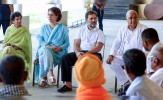Opinion: The Changing Role Of Religion In Politics
From Rathayatra to Pran Pratishtha, Indian politics has come a full circle. If LK Advani is to be credited for initiating the process of bringing the Ram Mandir into Indian politics, then Prime Minister Narendra Modi gets the credit for taking it to its logical conclusion.
Before Advani's Rathayatra, the idea of religion in politics was never mainstream, though some politicians and parties did try to exploit religious sentiments for electoral purposes. The Congress is blamed for Muslim appeasement, which is well-founded, but Muslims didn't dictate the politics of the Congress. In the Modi era, religion has taken centre-stage and no party can afford to ignore it.
The reality today is that within the domain of a secular Constitution, religion is dictating terms in politics. If independent India's first prime minister Jawaharlal Nehru had a problem with then President of India, Rajendra Prasad, attending the consecration of Somnath Temple, it is now 180 degrees opposite with Modi proudly visiting Hindu temples and not hesitant to position himself a devout Hindu leader.
Only history will judge whether Nehru was right or Modi is. Nehru was of the firm opinion that in modern India, in a plural society with diverse faiths, the state should not be seen to be aligning with any particular religion; gods and faiths should remain in the private space of an individual. For him, secularism did not mean negation of the religion, secularism was respect to all religions. It is a wrong perception that Nehru was anti-religion - he was, in fact, deeply spiritual, though he eschewed ritualism.
Nehru tries to answer the question himself. "What is religion?" he asks, proceeding to venture an answer, "Probably it consists of the inner........
© NDTV





















 Toi Staff
Toi Staff Belen Fernandez
Belen Fernandez Andrew Mitrovica
Andrew Mitrovica Gideon Levy
Gideon Levy Tarik Cyril Amar
Tarik Cyril Amar Rachel Marsden
Rachel Marsden Warren J. Blumenfeld
Warren J. Blumenfeld Dr Ramzy Baroud
Dr Ramzy Baroud Tafi Mhaka
Tafi Mhaka Adam Makary
Adam Makary
